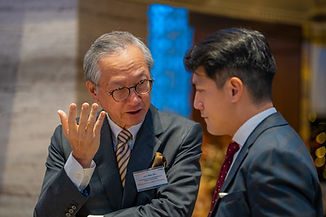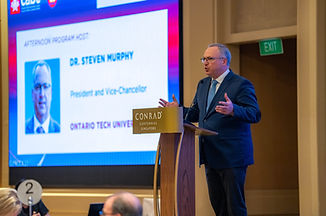CABC NUCLEAR ENERGY WORKING GROUP

Since its launch in late 2024, the CABC Nuclear Working Group has made significant progress in facilitating regional collaboration and promoting Canada’s nuclear energy expertise across ASEAN. This inaugural update outlines key activities, upcoming priorities, and ways for members and stakeholders to stay engaged as we build momentum for nuclear energy as part of Southeast Asia’s clean energy future.
The CABC Nuclear Energy Working Group was officially launched on November 29, 2024, at the 1st Canada-ASEAN Energy Transition Summit in Singapore.

Chaired by Jan De Silva, the Working Group brings together Canadian stakeholders, businesses, policymakers, regulators, and academic institutions, to support dialogue, partnership development, capacity-building, and public awareness in ASEAN’s emerging nuclear energy sector.
The Working Group is focused on positioning Canada as a reliable partner in ASEAN’s nuclear energy future through policy collaboration, technical engagement, and commercial pathways.
In its first few months, the Working Group has laid strong groundwork through strategic engagements and thought leadership, contributing to a deeper understanding of Canada’s nuclear capabilities and opportunities in ASEAN by hosting 2 events in Singapore, the Canada-ASEAN Energy Transition Summit in November and the Nuclear Energy Capacity Building Symposium in February.

Canada-ASEAN Energy Transition Summit
November 29, 2024 | Singapore
Hosted in partnership with the Government of Canada
The Summit convened over 100 Canadian and ASEAN leaders to explore opportunities for the region’s energy transition. The event drew senior-level participation from government, business, and research institutions.






Summit Highlights:
-
Opening remarks by Wayne Farmer (President, CABC) and Paul Thoppil (Canada’s Indo-Pacific Trade Representative), with virtual messages from The Honourable Mary Ng and ASEAN Deputy Secretary-General Satvinder Singh.
-
Launch of the CABC Nuclear Energy Working Group. Press coverage by The Straits Times
-
Plenary 1: Canada as ASEAN’s Nuclear Energy Partner
-
Showcased Canada’s leadership in uranium supply, nuclear technologies (CANDU reactors, SMRs), and medical radioisotopes.
-
Highlighted nuclear energy as a scalable, clean solution for ASEAN’s electrification and decarbonization needs.
-
Ontario’s coal phase-out success and 92% zero-carbon electricity generation, with nuclear accounting for nearly 60%.
-
Strengths of CANDU technology: 24/7 operation, energy security, strong local supply chain, and natural uranium fuel use.
-
Ongoing nuclear projects in Ontario, Saskatchewan, and New Brunswick as regional models.
-
-
Plenary 2: The Role of Investments and Sustainable Finance to Close ASEAN’s Energy Transition Funding Gap
-
Emphasized private sector capital’s essential role in accelerating ASEAN’s clean energy adoption.
-
Explored innovative financing mechanisms like blended finance, ESG and climate reporting, carbon credit market development, and green investment opportunities.
-
Shared perspectives from Canadian and ASEAN companies, investors, and policymakers on sustainable finance and collaboration potential.
-
-
Plenary 3: Fuelled by Canada: Exploring Energy Transition Partnerships with ASEAN
-
Examined ASEAN’s energy transition needs and Canada’s contributions in CCUS, hydrogen, ammonia, and LNG solutions.
-
Highlighted Canada’s supportive business environment, regulatory stability, and abundant natural resources as a hub for ASEAN partnerships and investments.
-
-
The Summit concluded with a networking reception to foster bilateral and regional partnerships between Canadian and ASEAN stakeholders.
Nuclear Energy Capacity Building Symposium
February 19, 2025 | Singapore
Presented by Humber Polytechnic and Ontario Tech University In partnership with the Government of Canada
Held during the Canada-in-Asia Conference (CIAC 2025), titled “Delivering a Generation of Jobs in the Nuclear Energy Sector,” this full-day symposium, organized by the CABC Nuclear Energy Working Group, successfully brought together Canadian and ASEAN leaders to highlight the workforce and institutional readiness needed to support ASEAN’s nuclear energy ambitions.
Supported by the Government of Canada, the Government of Saskatchewan, and the Canadian Nuclear Association, the event showcased Canada’s leadership as a Tier 1 nuclear nation, emphasizing how decades of innovation have built a high-value supply chain and a strong academic ecosystem. Canadian business, government, and post-secondary representatives shared valuable insights on workforce development, regulatory capacity, and the socio-economic impacts of nuclear energy.






Symposium Highlights:
-
Remarks from The Hon. Mary Ng, Minister of Export Promotion, International Trade and Economic Development, and The Hon. Warren Kaeding, Minister of Trade and Export Development, Government of Saskatchewan
-
Opening keynote by Fred Dermarkar, CEO of Atomic Energy of Canada Ltd. (AECL)
-
Panel discussions covering Canada’s nuclear credentials, industry workforce development, and academic readiness
-
Fireside chat with ASEAN Centre for Energy discussing regional nuclear energy capacity needs
-
Educational leadership panel featuring top Canadian universities and polytechnics
-
Panel 1: Canada’s Nuclear Credentials
-
Featured insights from AECL, the Canadian Nuclear Association, and CANDU Energy, showcasing Canada’s deep nuclear expertise, 24/7 baseload technology, and robust local supply chain.
-
Highlighted Canada’s role in supporting ASEAN’s energy transition through proven, scalable clean energy solutions.
-
-
Panel 2: A Generation of Jobs – An Industry Perspective
-
Discussed how nuclear energy drives high-value job creation across advanced trades, engineering, and research.
-
Industry leaders from CNA, Velan Inc., and AtkinsRéalis shared insights into workforce needs, training models, and international partnerships.
-
-
Fireside Chat: Reflections on Getting Started – What ASEAN Needs
-
ASEAN Centre for Energy shared perspectives on nuclear readiness, regulatory frameworks, and capacity-building strategies.
-
-
Panel 3: Building Your Bench – Canada’s Experience
-
Top academic leaders from Humber College, Ontario Tech University, University of New Brunswick, and Saskatchewan Polytechnic discussed the importance of applied education, industry collaboration, and curriculum design in preparing the nuclear workforce.
ASEAN Nuclear Energy Sub-sector Network

CABC Nuclear Energy Working Group was invited to speak at the Workshop on Nuclear Power Plant Development held by the Ministry of Energy Transition and Water Transformation of Malaysia and ASEAN Centre of Energy on April 28, 2025, at the sidelines of the 15th Nuclear Energy Cooperation Sub-Sector Network Meeting in Kuala Lumpur, Malaysia.
At the workshop, the CABC Nuclear Energy Working Group was represented by Dr. Sara Supaamornkul, Director of Business Development (Asia Pacific) at AtkinsRealis, who introduced CANDU Monark nuclear technology to the participants.
The workshop was attended by senior officials and policymakers from ten ASEAN Member States, the Korea Nuclear Association, Japan’s Integrated Support Centre for Nuclear Nonproliferation and Nuclear Security, the Japan Atomic Energy Agency, and the Global Centre for Nuclear Energy Partnership.
One of the key outcomes of the meeting was that ASEAN member states agreed to actively explore the potential of nuclear power as a clean and reliable source of electricity to support the region’s energy transition and reduce dependence on fossil fuels.
North Star Energy Security Summit
Earlier this spring, Jan De Silva and Wayne Farmer had the opportunity to participate in the North Star Energy Security Summit — an invitation-only gathering of approximately 100 senior leaders from industry, finance, academia, and government. While the discussions were held under Chatham House Rule, Jan moderated a roundtable on AI and Grid Expansion, a critical and timely topic as Canada explores modernization of its energy systems and the role of nuclear and other clean technologies. The summit’s format focused on small group discussions and curated breakout sessions provided a valuable forum to exchange insights and build connections that can help advance Canada’s role in global energy security.
The Philippines Nuclear Delegation to Canada
The working group participated in panels during The Philippines Nuclear Delegation to Canada, highlighting on Canada’s leadership in nuclear innovation, financing, supply chain development, and regulation, reinforcing the sector’s vital role in global clean energy and economic advancement. The discussions include:
Financing & Data Centers: Wayne Farmer shared insights on Asia’s outlook during the conversation that showcase Canada’s diverse financing tools, government funding, private investment, and green bonds are helping advance nuclear projects. Bruce Power, a global leader, has raised $1.7B in green bonds. With growing electricity needs, especially from data centers, nuclear is gaining traction as a reliable 24/7 energy source. Microsoft’s recent PPA with Constellation to restart a nuclear unit signals a new financing path.
Ontario’s Nuclear Ecosystem: Canada’s CANDU reactors support a 95% localized supply chain and over 90,000 jobs. As the only technology to co-produce medical isotopes, Canada is poised to lead in a global market expected to reach USD 33B by 2031. Laurentis Energy Partners emphasized the economic benefits of this model.
Regulatory Framework: Canada’s federal-provincial structure balances strong national regulation with regional energy planning. This enables innovation, safety, and alignment with local development priorities.
These sessions reaffirm Canada’s potential as a global partner in clean, secure nuclear energy.
